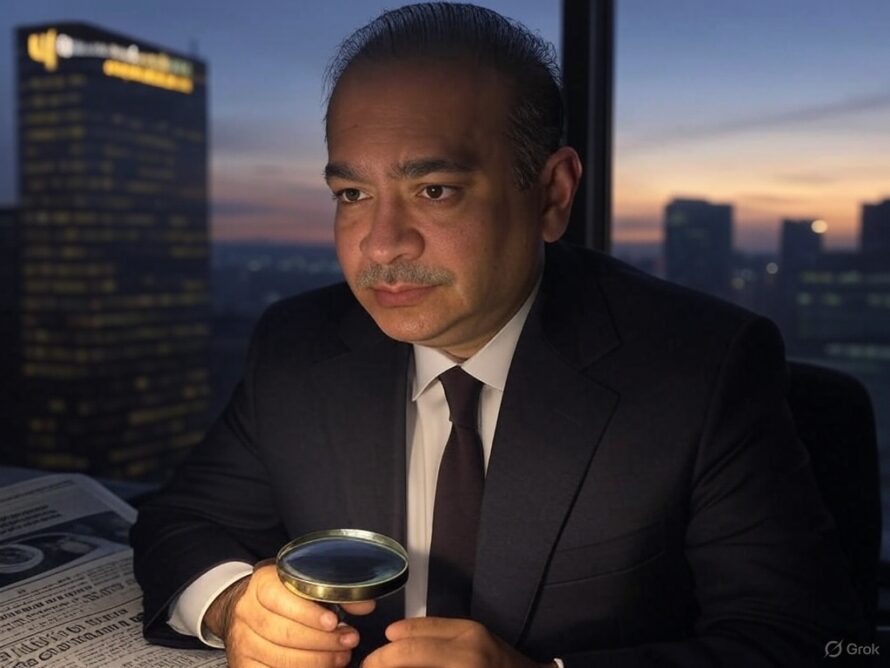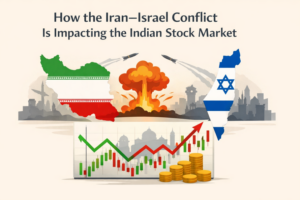Who is Nirav Modi? | PNB Scam case | Nirav Modi Case

Key Highlights
- Nirav Modi is an Indian-born Belgian fugitive wanted for his alleged involvement in a massive fraud case against the Punjab National Bank (PNB).
- The scam, which came to light in 2018, involved fraudulent Letters of Undertaking (LOUs) being issued to Modi’s companies, causing significant financial losses for PNB.
- Modi, along with his associates, fled India before the scam was uncovered and sought political asylum in the UK.
- Indian authorities have been pursuing his extradition from the UK to face charges of fraud, money laundering, and criminal conspiracy.
- The PNB scam led to significant reforms in the Indian banking sector, including tighter regulations on LOUs and increased scrutiny of financial transactions.
Introduction
The name Nirav Modi became famous worldwide in 2018. It was not because of his beautiful diamond jewelry, but due to his suspected role in a huge financial scam in India. This fraud affected the Punjab National Bank (PNB) and shook the Indian banking system. As a result, Nirav Modi’s successful career as a jeweler came to an end. This blog looks at the rise and fall of Nirav Modi. It dives into the details of the PNB fraud case and its wide-reaching effects.
The Rise of Nirav Modi
Nirav Modi was born into a family involved in the diamond business. His journey began in Belgium, and he moved to India in 1989. He soon understood the diamond industry and had dreams to make a name for himself in the global luxury market.
Motivated by a desire to make a unique brand known for luxury, Modi started Firestar Diamond International. This decision helped him rise quickly in the world of high-end jewelry design and retail.
Early Beginnings and Entry into the Diamond Business
Nirav Modi grew up in a family deeply connected to the diamond business. He was born in Palanpur, Gujarat, but later, his family moved to Antwerp, Belgium. This city is the center of diamond trading. At the age of 19, he wanted to continue his family’s work, so he and his father went to Mumbai. There, they worked with his uncle, Mehul Choksi, who led the well-known Gitanjali Group, a big name in jewelry retail.
When Modi arrived in Mumbai, it was a tough time for him. He worked hard to learn all about the diamond trade. He gained knowledge and experience from experienced people in the field. His strong desire to learn helped him prepare for his future business ideas.
This time in his life was when Nirav Modi began his journey as a businessman. With a deep love for diamonds and the skills he developed, he started his own business in 1999. He launched Firestar Diamond International, which started as a company for diamond sourcing and trading.
Establishment of the Nirav Modi Brand and Global Expansion
Nirav Modi started to focus on a bigger goal with his brand, Firestar. He wanted to make his own luxury jewelry brand that stands out. His aim was to show elegance, art, and uniqueness in his pieces. This dream came true when he launched the Nirav Modi brand in 2010, opening his main store in New Delhi.
His brand quickly caught the eye of customers in India and other countries. People loved his beautiful designs, which showed great skill and used rare diamonds. Modi saw this success as a chance to grow his brand globally.
In 2015, he opened flagship stores in major cities like New York City and Hong Kong. He later expanded to Macau. His brand earned praise around the world, with his jewelry appearing on red carpets and being liked by well-known people. This made Modi a notable name in the luxury jewelry scene.
Unraveling the PNB Scam
Behind this surface of achievement, there was a hidden truth of dishonesty that started to come to light in early 2018. What began as a check by the Punjab National Bank turned into a huge scandal. This scandal revealed huge fake financial deals.
The main part of the scam involved Letters of Undertaking (LOUs). These are used in international trade finance. They were wrongly used to steal money from PNB. The scam led to Nirav Modi losing everything. He went from a successful business owner to a fugitive in a matter of days.
The Genesis of the Fraudulent Transactions
The PNB fraud began at the busy Brady House branch of Punjab National Bank in Mumbai. Investigations show that this branch was the center of a complicated web of fraudulent transactions that went unseen for years. The main elements of these transactions were Letters of Undertaking (LOUs). These are guarantees that a bank gives on behalf of a customer, which in this case are Nirav Modi’s companies, to another bank, usually located abroad.
These LOUs were meant to help with short-term credit for imports but were reportedly obtained by Modi’s group through dishonest means. The scam involved bank officials working with Modi and his team, issuing LOUs without permission and bypassing the regular banking system. Because of this, the transactions avoided regular checks and did not show up in PNB’s accounts, hiding the fraud very well.
According to investigators, these fake LOUs allowed Nirav Modi and his associates to get unauthorized credit from other Indian banks’ overseas branches. This diverted funds from PNB for years, rising into a huge debt for the bank. It was only noticed when a new worker at the Brady House branch pointed out odd activity.
How the Scam was Executed Over the Years
The PNB scam is one of the biggest banking frauds in India. It was carried out through a planned scheme with many players inside and outside the bank. Important people involved in this alleged scam were Nirav Modi, his uncle Mehul Choksi, and various bank officials at PNB’s Brady House branch. Investigations showed that bank officials misused their access to the SWIFT messaging system. This system is used globally by banks to safely share financial information.
These officials are said to have issued fake Letters of Undertaking (LOUs) for Modi’s companies. They sent these through SWIFT to banks abroad, but they did not record these guarantees in PNB’s main banking system. This kept the transactions hidden from the bank’s internal audit and risk management systems. Because of this, the scam went unnoticed for seven years.
A key part of keeping the scam secret was the help from bank employees. It is said that they aided in breaking rules and ignoring warning signs, either because they were careless or part of the scheme. This scam shows that there was a failure in the internal systems and highlights the urgent need for better protection in the banking sector.
Legal Battles and Extradition Efforts
As the surprise from the PNB scam faded, Indian law agencies began their strong fight for justice. They worked hard to bring Nirav Modi back to India to face the legal issues from his alleged actions.
They started legal steps, filed charges, and issued international arrest warrants. This set up a long legal fight that still makes news today.
Arrest and Legal Proceedings in the UK
Nirav Modi tried to avoid Indian authorities by going to the United Kingdom. He kept a low profile while there. His attempts to stay out of the spotlight ended in March 2019. That’s when he was arrested in London. UK authorities acted on a request for extradition from India. This marked an important win for India in its effort to bring him to justice.
After his arrest, Modi went to a UK court. This led to legal battles that went on for years. He fought hard against extradition. Modi filed many bail applications. Each one was heavily opposed by both the Indian authorities and his legal team.
In the end, the UK court turned down Modi’s bail requests. They said he could easily flee and noted how serious the charges against him were. This meant he stayed in Wandsworth Prison in London while the court dealt with the complicated extradition case.
Efforts by Indian Authorities to Extradite Nirav Modi
The arrest of Nirav Modi in another country boosted India’s efforts to bring him back. Indian officials worked hard to create a strong case for the UK Court. The Enforcement Directorate (ED) and the Central Bureau of Investigation (CBI) led the investigation. They carefully collected proof of Modi’s supposed role in the PNB scam.
This included gathering financial records, details of transactions, and witness statements. Each item was carefully checked and shown to the UK court in the extradition request. The Indian government made a strong case, pointing out the significant evidence against Modi and stressing the need for him to face justice for his alleged crimes.
Their strong drive for justice and the strong evidence led to an important decision in February 2021. A UK court agreed with India, which moved the process for Modi’s extradition forward. While Modi’s lawyers are still appealing the decisions to delay his return, this ruling is a major win for the Indian government and brings hope for solving the PNB fraud case.
Impact on the Banking Sector and Reforms Initiated
The PNB scam shocked India’s banking system. It showed weaknesses in the system and raised worries about financial safety. The effects of the fraud were serious. Investor confidence dropped, and many started reviewing current banking methods.
But the scam also pushed for changes. Authorities began to create new rules and protections to make the banking sector stronger against threats in the future. The scam started an important talk about making financial institutions more accountable and clear.
Repercussions for Punjab National Bank and the Banking Industry
The big fraud caused a lot of harm to Punjab National Bank’s (PNB) reputation. The bank faced large financial losses which affected its profits and the trust of investors. The impact of the scam reached further than PNB, shaking the whole banking industry in India.
This event was a strong warning. It showed important gaps and problems in how risk was managed across banks. People started to wonder about internal controls, how loans were given, and if regulatory checks were effective. Right after the incident, banks hurried to examine their procedures, improve checks, and strengthen their internal audits.
The PNB scam led to a full risk assessment across the banking industry. It brought more attention to training employees, ethical behavior, and ways to report wrongdoing. The situation highlighted the urgent need for a strong set of rules to keep India’s financial system stable and trustworthy.
Regulatory Changes and Safeguards Post-Scam
After the PNB scam, the Reserve Bank of India (RBI) started to make changes to rules and regulations. The goal was to close the gaps that the scam used and stop it from happening again. The RBI took strong steps, setting stricter rules for Letters of Undertaking (LOUs) and improving the know-your-customer (KYC) guidelines. They also asked banks to do better checks for international transactions.
To keep track of transactions, new real-time monitoring systems were set up. Banks were told to connect their core banking systems to SWIFT. This way, they could better watch and match transactions. They also made auditing stricter, focusing on doing audits while transactions happened and imposing tougher penalties for mistakes or failing to follow rules.
These big changes show a clear effort to make the banking sector more open and responsible. The PNB scam was a hard lesson, showing how important it is to be watchful and have solid risk management to protect both the banks and the nation’s money.
Conclusion
In the story of Nirav Modi, we see how a well-known figure in the diamond industry rose and fell. His journey shows what can happen when power and money are not checked. Starting from small beginnings, he gained fame but also caused a scandal that shook the banking world. As he faces legal struggles and efforts for extradition, Nirav Modi’s case highlights why transparency and accountability are so important for financial institutions. The results of this scandal have led to important reforms, reminding us that we need strict oversight and good ethics in finance.
Frequently Asked Questions
What led to Nirav Modi’s rise in the diamond industry?
Nirav Modi’s success comes from his natural talent for the diamond industry, which he learned from his family’s history. He also has a smart way of doing business. His focus on beautiful craftsmanship and using rare diamonds to make luxury jewellery helped him stand out in the worldwide market. He also planned his branding well to grow his business.
How did Nirav Modi manage to evade authorities for so long?
Nirav Modi reportedly used several passports and found ways around the law. This helped him avoid getting caught by authorities for a long time. His regular trips abroad and a well-thought-out plan to dodge attention kept him hidden for quite some time.
What are the major legal charges against Nirav Modi?
Nirav Modi is facing many legal charges. These charges include fraud, money laundering, and criminal conspiracy. They are under the Prevention of Money Laundering Act (PMLA) and the Indian Penal Code. All these issues come from his supposed involvement in the large PNB fraud case.
How has the PNB scam affected India’s banking sector?
The PNB scam caused a big loss of trust in India’s banking sector. This made investors lose confidence quickly. It also led to important changes in regulations. Now, there are stricter rules and a tougher look at how risks are managed.
What is the current status of Nirav Modi’s extradition case?
The UK Court has agreed to India’s request to extradite Nirav Modi. However, his legal team keeps filing appeals. This has led to a long legal struggle. Right now, Modi is waiting for the results of these appeals. Meanwhile, Indian authorities are actively involved in the ongoing legal cases.
Disclaimer
The stocks mentioned in this article are not recommendations. Please conduct your own research and due diligence before investing. Investment in securities market are subject to market risks, read all the related documents carefully before investing. Please read the Risk Disclosure documents carefully before investing in Equity Shares, Derivatives, Mutual fund, and/or other instruments traded on the Stock Exchanges. As investments are subject to market risks and price fluctuation risk, there is no assurance or guarantee that the investment objectives shall be achieved. Lemonn (Formerly known as NU Investors Technologies Pvt. Ltd) do not guarantee any assured returns on any investments. Past performance of securities/instruments is not indicative of their future performance.







